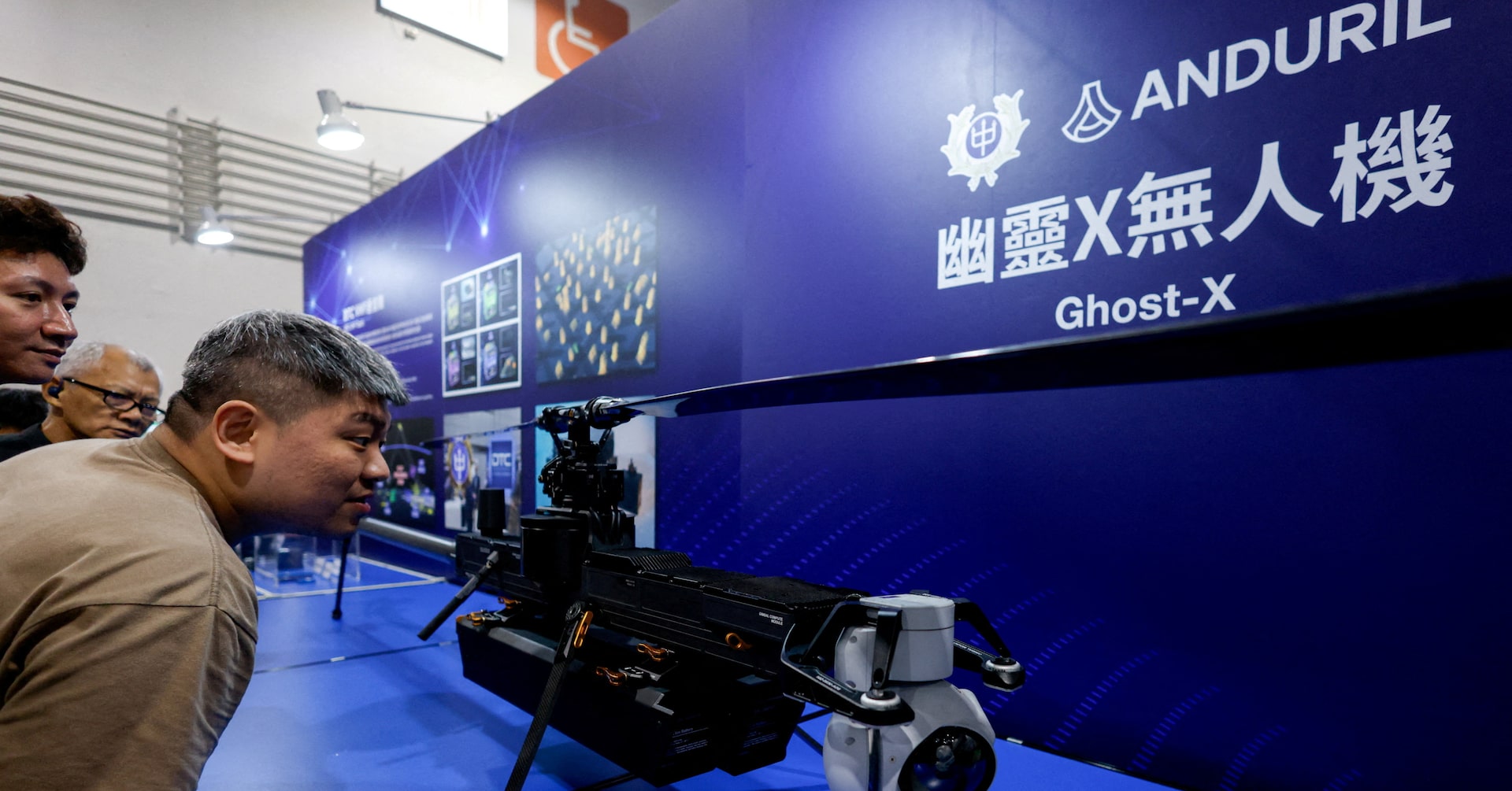NEW YORK, Nov 27 (Reuters) – A U.S. military plane soared over Florida’s Eglin Air Force Base earlier this month and released a drone made by the defense tech giant Anduril Industries to test whether it could take flight and conduct surveillance.
The drone – a winged model known as Altius – nosedived 8,000 feet into the ground, according to an Air Force test summary, reported here for the first time. Shortly afterwards, a second Altius drone spiraled to earth during a separate test, the summary said.
Sign up here.
Anduril has described its Altius drone, which can be used for surveillance and carry munitions, as battle-ready and says it has sent hundreds to Ukraine since Russia’s full-scale invasion started in 2022. The company says Altius can launch from ground, air, or sea and, depending on the model, offer long-range strike capabilities or the ability to fly for hours.
But the previously undisclosed failure of the two Altius drones during the Air Force tests this month, as well as setbacks for Anduril’s Ghost drone program – including in Ukraine – highlight a gap between the U.S. company’s claims of battlefield readiness and the performance of some of its drones in testing and combat, according to interviews with more than a dozen people, including former Anduril staff, military officials, and people working with drones on the Ukrainian battlefield.
Western drone makers, including Anduril, have had limited impact so far on the battlefield in Ukraine. Mykhailo Fedorov, a deputy prime minister of Ukraine, said on Telegram in November 2024 that of one million drones deployed to the front lines that year, 96% were Ukrainian-made.
Shannon Prior, an Anduril spokesperson, said the incidents documented by Reuters are “isolated examples” across hundreds of tests.
“We are constantly proving out new capabilities for all of our systems, pushing them to the limit so that we can learn, iterate, and improve our systems,” she said. “Test failures are a natural – and intentional – part of that process.”
Prior added the Altius has previously flown “more than 2,000 hours” in tests, demonstrations and deployments, without providing details of what the results of those tests were.
Reuters could not determine how many Altius test flights have resulted in failures.
After the news agency contacted Anduril for comment, the company posted a blog detailing testing issues related to the Altius and Ghost drones, in addition to its command and control software, Lattice. “Those failures, and the learning they afford, are an essential and unavoidable part of the development process,” the company said.
A spokesperson for the Air Force Special Operations Command confirmed the Altius demonstration occurred this month but declined to comment further.
The Armed Forces of Ukraine declined to comment on the performance of Anduril’s equipment, saying the effectiveness of weapons and military technology is restricted information, citing laws covering state secrets.
‘WE’RE GOING TO MOVE FAST’
Anduril has a rapidly growing portfolio of weapons systems in development, spanning an autonomous warship it is co-developing with Hyundai to the “Fury,” a large drone designed to fly alongside manned fighter jets.
“We’re going to move fast, build what works and get it into the hands of the people who need it,” Luckey said during a speech in Taiwan this summer.
The Pentagon didn’t respond to a comment request.
The war in Ukraine has provided an opportunity for the company to battle-test and promote its products as it looks to boost its business with the Pentagon and with Taiwan.
The company sent about 40 models of its Ghost drone, which looks like a miniature helicopter and can be used for reconnaissance, to Ukraine early in the conflict that began in 2022, according to a source with direct knowledge of the matter.
But the initial model struggled to withstand Russian electronic warfare, frustrating Ukrainian soldiers, according to four people familiar with the matter. The person with direct knowledge of the matter said the company misunderstood how both terrain and Russia’s jamming of satellite-based navigation systems could derail flight plans.
Anduril spokesperson Prior said “everyone was having problems” with jamming from the outset of the war. She said that Anduril’s “teams work side by side with end users every day to capture feedback, push software updates in real time, and adapt systems under combat conditions.”
Prior said an updated model, the Ghost X, was delivered to the frontlines in Ukraine in December 2023 and “proved that the lessons learned earlier in the year were addressed.”
GHOST GOES DOWN IN TESTING
But the Ghost X has also had issues in more recent tests. A video shared with Reuters and separately posted in January 2025 on US ArmyWTF, an Instagram account run by an Army veteran, showed a Ghost model spinning out of control before crash landing near soldiers in an unidentified location.
“I told you this would be a clusterfuck,” said one unidentified person in the video.
Reuters verified the footage as having been recorded during a weeks-long U.S. Army exercise in Hohenfels, Germany that began in mid-January, and included use of the Ghost X.
Anduril said the incident occurred due to an issue with a rotor and said it was fixed.
Major Geoffrey Carmichael, a spokesperson for the U.S. Army’s 10th Mountain Division that was involved in the exercise, said that when units are experimenting with new technologies such as drones “hard landings, system failures, and weather-related impacts can occur.”
Of the Ghost X specifically, Carmichael said the drone “demonstrated strong performance in cold, high-altitude, and hot-weather environments” but that units identified areas for improvement, “particularly power management in extreme cold.”
Anduril, in its blog post, said U.S. Army units had “consistently praised” the reliability of Ghost X.
ALTIUS IN UKRAINE
Anduril initially sent about 100 Altius drones to Ukraine in 2023, according to two sources. In March of this year, the UK Ministry of Defence announced a £30 million (about $40 million) contract paid for by a UK-led international fund to send an undisclosed number of Altius drones to Ukraine.
Britain’s Defense Ministry told Reuters the deal was to provide advanced Altius drones to Ukraine to tackle Russian aggression in the Black Sea. It said the Altius drones were recently delivered to the Ukrainian Navy, “who have expressed their satisfaction with them.”
The Ukrainian Armed Forces didn’t provide further comment.
Anduril told Reuters it has “shipped hundreds of Anduril systems to Ukraine” and that “they’ve proven effective against a large number of high-value enemy assets.”
Reporting by David Jeans in New York, Cassell Bryan-Low in London and Supantha Mukherjee in Stockholm; additional reporting by Tom Balmforth and Milan Pavicic in London and Max Hunder in Kyiv; Editing by Joe Brock and Michael Learmonth
Our Standards: The Thomson Reuters Trust Principles.








